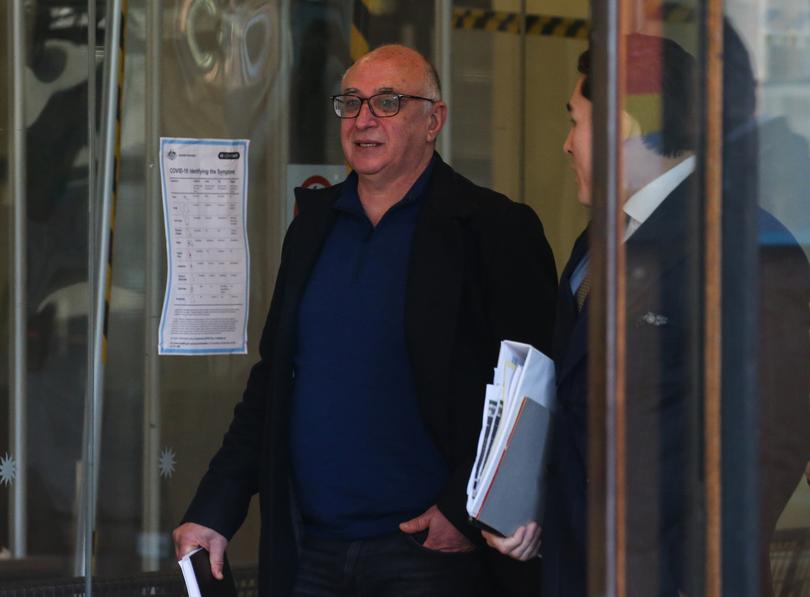Plot to launder $11 million of Plutus Payroll Scam cash in three countries and how it unravelled
The latest twist in the $105 million Plutus Payroll case and the alleged efforts of two Sydney developers to ‘wash’ the funds have been laid bare in the NSW Supreme Court.
It was a stunningly brazen plot to “clean” more than $11 million of stolen taxpayers’ money through Lebanon, Dubai and Hong Kong and the plans were going swimmingly according to police telephone intercepts — until they weren’t.
In a fresh legal twist, the extraordinary story of Australia’s biggest tax fraud, the $105 million Plutus Payroll scam and a subsequent blackmail has had its final chapter with two property developers enlisted to “wash” the funds, being ordered to pay it back.
Michael Teplitsky, a developer from Sydney’s ritzy eastern suburbs will have to repay $11 million and his companies TepCorp Investments and TepCorp Holdings another $6.8 million in interest. Separately, Glen Saikali, another developer and builder has also been ordered to repay $2.6 million in a default judgement.
Sign up to The Nightly's newsletters.
Get the first look at the digital newspaper, curated daily stories and breaking headlines delivered to your inbox.
By continuing you agree to our Terms and Privacy Policy.But neither of the men has been criminally charged with any offence. Mr Teplitsky vigorously denied any knowledge of blackmail or illegality.
The inside story of the intriguing money laundering case came to light in a five-day civil trial in the NSW Supreme Court.
It was revealed the millions were originally obtained from the notorious Plutus payroll scam on the Australian Taxation Office by a cohort of now-convicted and jailed fraudsters including a former deputy tax commissioner’s son Adam Cranston.
But the Plutus fraudsters found themselves targeted by two associates who had discovered their tax scam and decided to extort them.

The blackmailers, Sydney developers Daniel Hausman and Daniel Rostankovski, threatened to expose them all to the media and the authorities if their demands were not met.
They used veteran journalist Steve Barrett as a threat without ever revealing to Barrett they were hatching a blackmail plot. Barrett was charged but the charge was sensationally dropped earlier this year.
Hausman and Rostankovski had already turned to Mr Teplitsky and Mr Saikali asking for help to make the large payments that started flowing from the blackmail look “kosher” and clean.
Mr Teplitsky was heard on the telephone taps talking about cleaning the money and sending it to Hong Kong.
LISTEN TO THE INTERCEPTED CALL IN THE PLAYER ABOVE
Unbeknown to all of the players, the police were already on to the Plutus Payroll scam and had stumbled across the blackmail plot while listening to the phones of Hausman and Rostankovski.
It was from those secret telephone taps they overheard the discussions about how the money was to be “cleaned”.

All of the scams, including the money washing, came to an abrupt halt in May 2017 when police swooped, raiding dozens of properties and arresting 15 people across Sydney.
Fifteen people have now been convicted and jailed over the Plutus payroll scam. Hausman and Rostankovski were both convicted and are serving jail terms for the blackmail.
Mr Teplitsky was arrested on the day of the raids after a scuffle with officers outside his Double Bay offices. He was later released and was never criminally charged with money laundering. Mr Saikali was also never charged.
But the authorities began chasing the stolen money, and liquidators Timothy Bryce Norman and Salvatore Algeri from Deloitte Australia were appointed to the company Plutus Payroll to try and claw back $182 million on the books as being owed to the ATO.
The liquidators sued Mr Teplitsky and his companies and Mr Saikali for the money plus interest.
The court was told by Jeremy Stoljar SC for the liquidators, that Hausman and Rostankovski needed a plausible explanation as to how the money came back into their hands and sought out Mr Teplitsky for the job.
Mr Stoljar said transcripts of conversations and police telephone intercepts played to the court revealed how the money laundering trail was set up in a string of deals designed as an “artifice to conceal what was happening”.

It was alleged Mr Teplitsky was the “architect of the scheme” and even if he didn’t know about the criminality, it should have been perfectly obvious.
But barrister for Mr Teplitsky Francis Douglas KC says he is innocent, was unaware of any criminality and, after the Plutus fraud was revealed, paid back the funds — which were then scooped up by the Australian Federal Police (AFP) in a proceeds of crime action.
Mr Douglas argued that it was an attempt at a “double recovery by the Commonwealth and the liquidators could and should seek payment by an exclusion order to the AFP Commissioner.”
Mr Douglas said Mr Teplitsky was in a confused state before the events because of a case of neurological encephalitis. He said it was because Mr Teplitsky had suffered a grand mal seizure before the events.
Judge Scott Nixon has found that it must have been obvious to Mr Teplitsky, and would have been obvious to any honest and reasonable person in his position, that the reason why Mr Rostankovski and Mr Hausman wanted to ensure that those funds were “washed”, “converted” and “cleaned” before being received by them, was to “disguise” the connection between them.
“I am satisfied that it would have been obvious to any honest and reasonable person in Mr Teplitsky’s position that Mr Rostankovski’s conduct … was a transgression of the ordinary standards of honest behaviour; and that Mr Rostankovski was engaging in this conduct because the funds in question had been obtained by some dishonest means, “ Judge Nixon found.
“I find that Mr Teplitsky’s failure to ask questions was a wilful and calculated failure. For those reasons, I find that Mr Teplitsky was wilfully blind as to Mr Rostankovski’s dishonest conduct and recklessly failed to make the inquiries which any honest and reasonable person in his position would have made.”
Judge Nixon said it was not alleged by the liquidator that Teplitsky had engaged in the offence of money laundering and his judgement does not address that issue.
The AFP says it has since restrained more than $50 million in assets from the Plutus payroll scam. Annual reports filed by the liquidators show they had only recovered $12 million before Judge Nixon’s judgement.
Millions remain missing.
